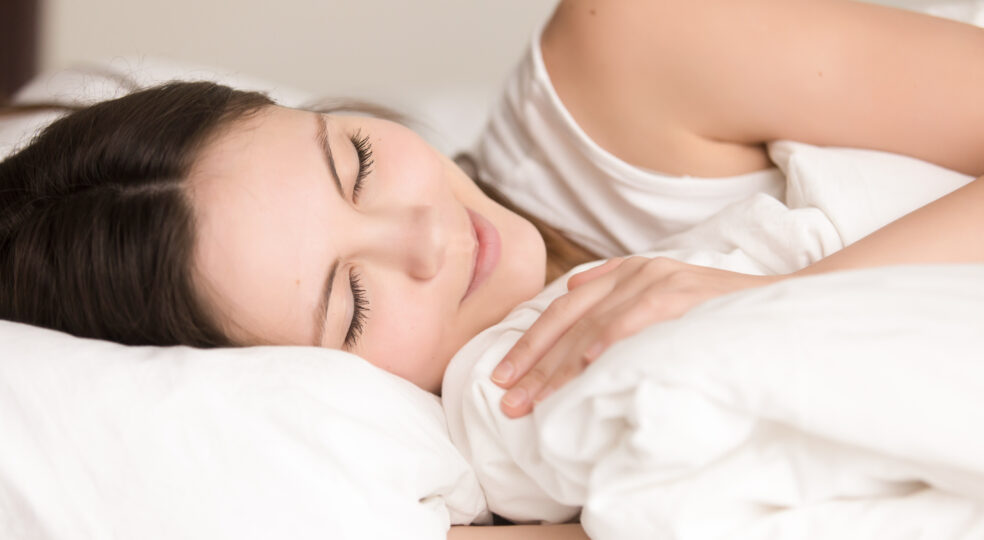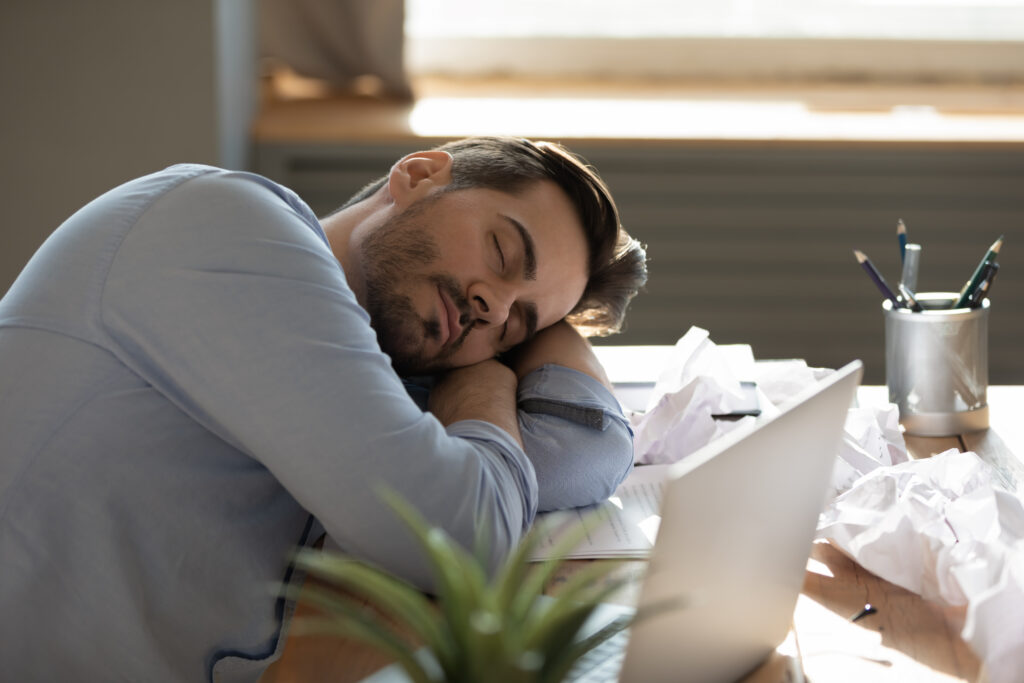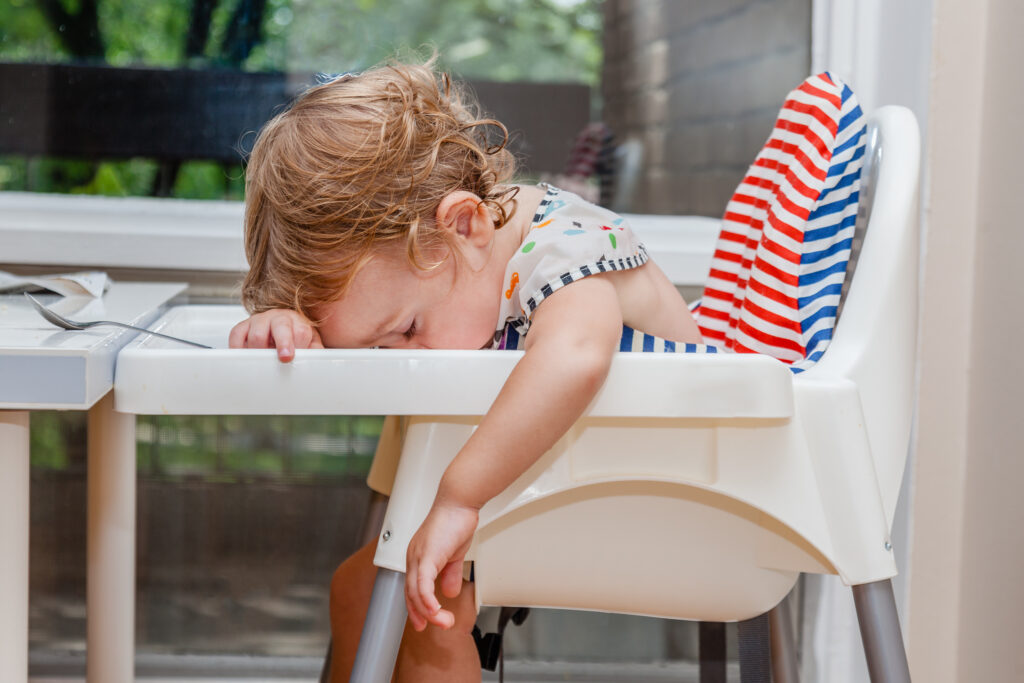
How can you fall asleep faster? This question occupies many people, because sleep disorders are widespread. According to current data of the RKI about 10.4 % of 18- to 39-year-old women and 7.6 % of men of the same age suffer from problems falling asleep at least three times a week.
The good news is that you can do something about problems falling asleep. We'll show you how simple tricks and small changes to your evening routine can help you fall asleep faster in the future.
How can you fall asleep faster? This question is not only relevant because falling asleep is perceived by most sufferers as psychologically very stressful. In the long term, lack of sleep can even demonstrably impair health.
An University of Florida study concluded, for example, that sleep disorders increase the risk of heart disease. In addition, a connection between lack of sleep and depression is suspected. But why is Sleep so important in the first place, and why does a lack of sleep increase the risk of disease?
Numerous regeneration processes take place in the human body during sleep. The brain processes what it has experienced during the day and cell renewal is in full swing. A lack of sleep disrupts this process, which is why you feel literally exhausted after a good night's sleep. In the long run, this can lead to serious health problems, as described above.
Surely you have heard something about mindfulness training. This is about focusing on the moment and allowing all sensations without judging them. A common reason why we can't fall asleep is because we brood.
Mindfulness can help take away the power of disturbing thoughts. If you want to learn more about the relaxation technique mindfulness and its concrete application, our Professional article on the subject may be interesting for you.

Whether or not you can relax and fall asleep depends largely on how you organize your bedtime. There are a few helpful tips that you should follow.
It may sound banal, but it is of great importance: try to always go to bed and get up at the same time, if possible. This also applies on the weekend or on vacation. This way, your body will get used to regular waking and sleeping times, making it easier for you to fall asleep.
Just as important as a fixed bedtime are relaxing Evening rituals that get your body in the mood for bedtime soon. This can be, for example, taking a relaxing bath or practicing a relaxation technique such as Meditation, breathing or mindfulness exercises.
As soon as you go to bed and actually want to sleep, your Thought carousel to turn around? It can help to write down all your worries, fold up the piece of paper and consciously put it away. Say to yourself: I won't deal with this again until tomorrow.
Another method is to imagine a safe with suction cups that suck in your worries. When all your worries are in the safe, close the door and mentally put the key away until the morning.
It's not always circling thoughts that rob us of sleep. Sometimes it's simply down to the wrong eating habits. Try to have your afternoon coffee as early as possible or switch to decaffeinated coffee in the afternoon.
Soft drinks containing caffeine in the afternoon or in the evening should be avoided as far as possible. The same applies to heavy food. If your stomach is busy digesting and your abdomen is uncomfortably tight, you won't be able to get to sleep.
Actually, you were already dead tired and wanted to sleep, but then you grabbed your cell phone again and - before you know it - surfed the Internet for almost an hour. Now you're wide awake and panicked again, knowing that you now have less sleep time until the alarm goes off. To avoid such a scenario, you should ban your smartphone from the bedroom.
How can you fall asleep faster when you are under acute pressure? Stress is one of the most common reasons for difficulty falling asleep. An important step is to reduce your overall stress level - including during the day - so that you can fall asleep more relaxed in the evening. One way to reduce stress during the day is to engage in regular physical activity.
Just before going to bed itself, as already mentioned, relaxation exercises or meditation can help. Do you already know the 4-7-8 breathing technique? It works as follows:
Just a few minutes of meditation can effectively help you fall asleep faster in the evening. Meditation provides inner peace and deep relaxation, which in turn are the basic requirements for falling asleep quickly. If you have never meditated before, are guided meditations a good option. Perhaps our free five-day Meditation Challenge something for you?
How can you fall asleep faster? Your sleeping environment is of great importance here. As you now know, relaxation plays an important role in falling asleep quickly. This means that you will only fall asleep where you feel comfortable and safe.
So create a harmonious and relaxed ambience. Clean up your bedroom and don't use it as a storage room. The right temperature also plays a role: it should be neither too hot nor too cold in your bedroom. A room temperature of around 18 degrees is ideal.
Furthermore, you should not have any electrical devices in the bedroom. This applies to the TV and laptop as well as to the smartphone. The electrosmog can damage your restful sleep impair. In addition, there is a temptation to reach for your cell phone or turn on the TV in the evening, which has a counterproductive effect on the process of falling asleep.
In the first step, you should try to avoid strong fluctuations in your bedtime and wake-up time. A regular rhythm forms the basis of healthy sleeping habits. Recurring evening routines - evening rituals - that prepare the psyche and the body for sleep are also helpful.
Also, try to avoid blue light (smartphone, TV) before bedtime, as it inhibits the release of the sleep hormone melatonin. The cell phone on the nightstand and the TV in the bedroom boycott your healthy sleep. The same applies to eating heavy meals too late, alcohol and caffeinated drinks.
You toss and turn in bed for hours at night and wonder how to fall asleep faster? Then the following eight steps will be helpful for you.
Sleep hygiene means that your bedroom meets all the requirements so that you can rest there. In addition to not using electronic devices, it also means that you don't lie in your bed during the day and spend waking hours there (e.g. on your cell phone). Your bed is intended exclusively for sleeping.
Since it's so important, we won't get tired of repeating it again. Set fixed bedtime and wake-up times to get your body used to a regular bedtime. accustom. This also applies on weekends as well as during vacation.
How can you fall asleep faster? Do you ask yourself that in despair while lying wide awake in bed? Then maybe your sleep pressure wasn't high enough. Everyone's need for sleep is individual. Only go to bed when you are really tired! But be careful: If you have exceeded this point, i.e. you are overtired, it will be more difficult to fall asleep again.
Admittedly, it's easier said than done: but the more you try to force yourself to fall asleep, the harder it will be. So try to stay as calm as possible, even if your alarm clock rings in a few hours. Instead of tossing and turning, it can help to get up briefly.
Regular physical activity during the day improves sleep quality. However, you should not do any sweaty exercise about two to three hours before going to bed. Sports exercise more.
People who can't sleep well at night usually lie down for an hour during the day. In principle, there is nothing wrong with this, but it depends on the time of day. Avoid naps after 3 p.m., as they can interfere with your sleep rhythm in the evening.
Find an evening routine that relaxes you. Whether YogaMeditation or a relaxing bath: it's entirely up to your taste. Instead of still using the cell phone in the evening, you can alternatively read a bit to get really tired.
How can you fall asleep faster when the rest of the family is still awake or light or street noise from outside is entering the bedroom? In this case, the purchase of blackout blinds and earplugs can be a good solution.

Worries are among the most common reasons that keep us awake at night. A good option is to write down the worries and symbolically put them in a drawer until the next morning. Alternatively, relaxation techniques such as meditation, mindfulness or breathing exercises help.
Air your bedroom well in the cooler morning and evening hours and darken your bedroom as much as possible. Instead of a comforter, you should only use a thin sheet in summer.
The rumor that sleep before midnight is the healthiest persists. However, sleep between 3:00 a.m. and 4:00 a.m. is much more important, as the body is at its biological performance low at this time.
It's true: alcohol makes you tired and you fall asleep faster. However, alcohol massively impairs the quality of your sleep by shortening the deep sleep phases. As a result, you don't feel refreshed in the morning.
A golden rule is: If you lie awake in bed for more than 20 minutes, get up and do something relaxing. Otherwise, you will feel more and more pressure to finally fall asleep. Therefore, it is better to leave the situation for a short time and only lie down again when you feel tired.
Not being able to fall asleep significantly affects your well-being. Fortunately, even a small change in evening habits can often help to effectively remedy the problem. This includes maintaining sleep hygiene as well as pleasant evening rituals and fixed bedtime and rising times.

